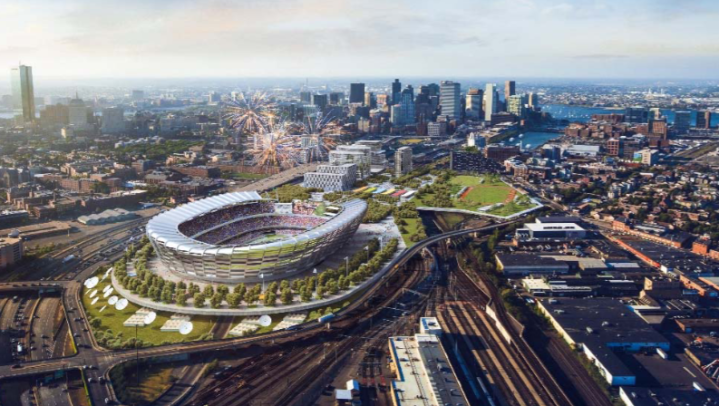
The ’24 Olympics could have been in Boston. Did the city miss an opportunity or dodge a bullet?
The ’24 Olympics could have been in Boston. Did the city miss an opportunity or dodge a bullet?

We’re two months away from the opening of the Paris Olympics, and organizers have just hit a snag: They had planned a rehearsal of the boat parade that’s set to open the Games for May 27, but they had to cancel because the water level in the Seine was too high. It’s the second rehearsal they’ve canceled this year.
If a proposal from almost a decade ago had come to fruition, these preparations would be taking place in Boston. In early 2015, the United States Olympic and Paralympic Committee backed the city’s proposal to host the 2024 Games. That sparked months of hype, vocal opposition and controversy before the city and the Committee scrapped the plans in the summer of 2015.
Now, as the 2024 Olympics approach, some in Boston feel the city missed an opportunity, while others are grateful the event is taking place an ocean away.
One organization that stood to benefit from Games was a tennis club in Boston’s Dorchester neighborhood: Sportsmen’s Tennis and Enrichment Center. The nonprofit is a club for paying adults and it runs after school educational programs for hundreds of kids. It’s been around since 1961.
“We were the first indoor nonprofit tennis club formed in the United States that was formed by and for the African American community,” said Sportsmen’s CEO Toni Wiley.
The club’s long history now includes a “what if.”
Back in 2015, organizers of Boston’s bid to host the 2024 Olympics told Wiley they wanted to build several tennis stadiums next to Sportsmen’s. Some would have been temporary, but one would have stayed there permanently, and the club could’ve used it to host tournaments and other events.
Wiley saw the plan as a chance to fix some issues in the neighborhood and its public park.

“We talked about the fact that this area doesn’t have a grocery store,” Wiley said, “and that there’s a lot of sports activity that happens on Harambee Park, but there’s no parking and there are no concession stands.”
The Olympic bid was organized by a private group called Boston 2024. It promised Bostonians the Games would come with lots of long-term benefits.
“It would have been a tremendous opportunity for the city, the state and the federal government to invest more in some of our infrastructure needs,” said Conor Yunits, who works for a public relations firm in Boston.
He came around to support the bid — after first being part of an opposition group — because he thought the Olympics would give Boston a deadline to fix its aging subway system, the T. These days, Yunits said, the T is in rough shape.
“The Green Line has had all sorts of shutdowns; the Orange Line has had slow zones,” he said. “I mean, the T in general is an absolute disaster.”
Yunits also thought that after the Games, the Olympic Village could’ve helped with the city’s housing crunch. Boston 2024 also promised many of the venues, including the Olympic Stadium, would be torn down after the Games to avoid leaving the city with massive stadiums for which it would have little use. The bid’s boosters said they could have done all of that using mostly private funds, and managed something no Summer Olympics has done since 1984: end the Games with a surplus.
But a report commissioned by the state in 2015 concluded that goal was far-fetched.
“There was a significant risk of cost overrun, which hadn’t been built into the plan,” said Pallavi Seth, who co-authored the state report for The Brattle Group, a consulting firm where she’s a principal. Her report determined who would ultimately shoulder those overruns.
“The risk was actually going to fall pretty much significantly on the state and local governments,” she said — meaning the taxpayers of Boston and Massachusetts.
“I think we dodged a meteor,” said Chris Dempsey, a partner at an urban planning and design firm, who was one of the leaders of a group called No Boston Olympics.
“We avoided billions of dollars of public debt that was going to be used in service of a two-and-a-half week television show, which is what the Olympics is,” he argued.
The Olympic bid died in July of 2015, in part because Dempsey and his allies had swayed public opinion against it.
Now, in 2024, the T is still kind of a mess and the city still needs housing, but Sportsmen’s Tennis has been expanding.
“We have grown very carefully and thoughtfully, but yes, exponentially over the last 10 years or so,” CEO Toni Wiley said.
There’s construction happening all around their building — for expanded indoor and outdoor courts, new classrooms and a community kitchen. The club is part way through an $18 million capital campaign. At this point, the idea of an Olympic tennis stadium next door is just a foggy memory.
There’s a lot happening in the world. Through it all, Marketplace is here for you.
You rely on Marketplace to break down the world’s events and tell you how it affects you in a fact-based, approachable way. We rely on your financial support to keep making that possible.
Your donation today powers the independent journalism that you rely on. For just $5/month, you can help sustain Marketplace so we can keep reporting on the things that matter to you.











